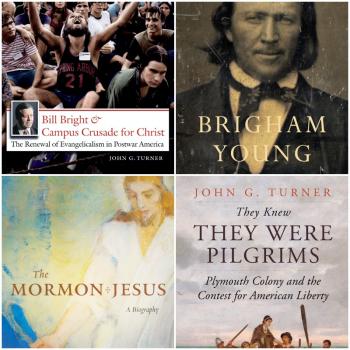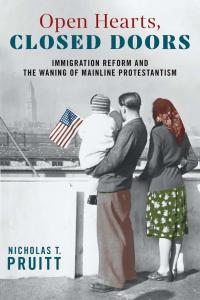It’s Thanksgiving. My plan was to plug my review of Tracy McKenzie’s The First Thanksgiving before stuffing myself with eel and turnips. Alas, it’s hard to feel thankful when one’s co-bloggers interrupt one’s plans by both reviewing the same book. But if I also write a hearty endorsement of Tracy’s book, visitors to the Anxious Bench will wonder if he’s paying us some sort of bribe.
Instead, I will make public expressions of Thanksgiving an annual affair. This is important, because I work in academia, a place that tends to breed a sense of entitlement and grousing rather than gratitude. We academics are all underappreciated. Students prefer any sort of electronic device to anything we say. And as David Swartz just pointed out, we feel good about cracking amazon’s top 100,000.
Speaking of Tracy’s book, I am grateful to him, John Fea, and Peggy Bendroth for writing three outstanding books about how Christians (academic and otherwise) should approach the past. I felt a renewed sense of vocation after reading them — what a gift to the church and the academy. Peggy encourages congregations to adopt the spiritual practice of remembering, reversing the impoverishment that comes from forgetting our predecessors in the great communion of saints. John writes so clearly about the issue of providence in history. I love how he provides examples of how his students have grown in their faith and understanding by researching unlovely aspects of history. Tracy’s style is so winsome that he could probably write a biography of Nick Saban that Auburn fans would love reading.
We are in a golden age of research and writing about the history of religion in the United States (and elsewhere). I can’t wait to read Molly Worthen’s attention-grabbing new book on American evangelicals. It’s quite something when you can garner a large measure of praise from Albert Mohler for a book on evangelicalism. In my own current subfield, books on Mormonism just pour off of the presses. I love J.B. Haws’s just-published account of Mormonism in the United States since 1945.
On a final academic note, I am grateful for the increased access researchers and other interested parties have to digitized sources. What a blessing!
I’m thankful that faithful and vibrant communities of Christians exist in so many places. I used to pay a great deal of attention to debates about whether Christianity is expanding, holding its own, or collapsing in different parts of the world. Yet everywhere I’ve lived in the United States, I’ve found churches thriving, sometimes because of inspiring music, sometimes because of outstanding preaching, and sometimes because of an ethos of fellowship and love. And this year, we’re living in Heidelberg, Germany. I know the dire statistics about religious practice in Germany. Nevertheless, there’s a good crowd at our local Protestant Gemeinde every Sunday. I have no idea what is being preached, because I’ve been accompanying our daughter to the Kindergottesdienst, but my heart is warmed by seeing so many children in church each week. I also love children’s church because I the teachers speak slowly and simply enough for me to understand.
Living abroad always creates new opportunities for thankfulness as well. I’m thankful for ready access to a bakery, for playgrounds built with apparently no fear of litigation, and for intelligent zoning laws that preserve countless swaths of lovely countryside. Nothing beats biking to work. I’m also glad that Americans produce vastly larger containers of milk, allow more people the opportunity to own homes, and live-stream Notre Dame and SEC football games. Okay, I’m only intermittently thankful while watching those live-streamed Notre Dame games. And I’m still decidedly unthankful about ordering Cable TV in order to watch the Notre Dame-Alabama “national championship game” last January. I cancelled the service pronto. I’m thankful there’s always next year.
I am thankful for the discipline of history, which enables us to get at least a glimpse of people created in the image of God. It is a privilege for us to study their lives, their communities, their accomplishments, and their failures. History reminds us of the goodness of God’s creation, and it reminds us of the need for redemption that all of us share. Thanks be to God.












